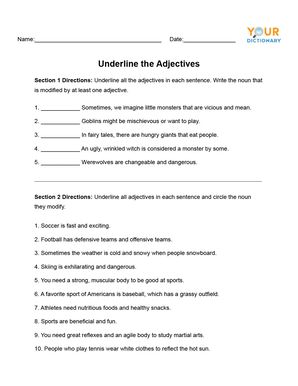

Third grade is an integral year of elementary school. Students use the skills they have learned in kindergarten, 1st and 2nd grade to develop stronger reading comprehension and writing skills. Properly teaching grammar skills is the key to improving 3rd graders' academic abilities. Teachers and parents can make sure that students master Common Core-aligned 3rd grade grammar skills with a quick overview and free worksheets.
Parts of Speech and Their Functions
The Common Core state standards for 3rd grade grammar set expectations for students knowing parts of speech. Having learned about parts of speech throughout elementary school, 3rd graders are now ready to explain their definitions and functions. Third graders should know the following parts of speech by the end of the school year:
- nouns
- pronouns
- verbs
- adjectives
- adverbs
Adjectives and adverbs especially can be tricky for 3rd graders. They can use a worksheet on adverbs to clear up any misunderstandings. Then, assign these adjective exercises to reinforce the difference between these two concepts.

Regular and Irregular Plural Nouns
Third graders go from identifying regular and irregular nouns to using them. Additionally, the challenge increases to the concept of plural nouns. Use these straightforward plural noun worksheets to reinforce both regular and irregular plural nouns in the context of sentences.
Abstract Nouns
This year, students are learning to expand their thinking into abstract concepts. That includes abstract nouns, such as freedom or emergency. Third grade is a good time to include the word "idea" when describing a noun as a "person, place or thing."
Regular and Irregular Verbs
If 3rd graders have already mastered their regular verbs, it's time to move to the next step. Using irregular verbs is an important skill to master before 3rd graders start forming more complex thoughts. Assign a worksheet on irregular verbs as homework or classwork to reinforce this concept.
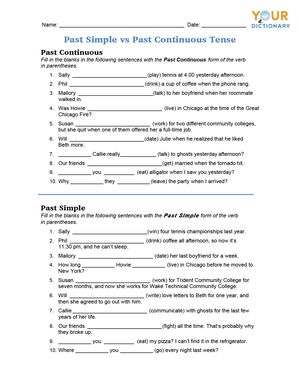
Past simple vs past continuous tense
Click to View & DownloadSimple Verb Tenses
Once 3rd graders have a strong knowledge of regular and irregular verbs, they can put them into different tenses. Students in 3rd grade are expected to put verbs into simple tenses, including past, present and future tense. Use a helpful verbs worksheet that helps 3rd graders practice each tense.
Subject-Verb Agreement
Do your 3rd graders know the rules for proper subject-verb agreement? If not, this is the year to make sure they do. Try out this subject-verb agreement worksheet to reinforce an important grammar topic in grade 3.
Pronoun-Antecedent Agreement
In 1st and 2nd grades, students work on learning and using pronouns. But 3rd graders are expected to use pronoun-antecedent agreement in their work, making sure that the pronouns match the nouns they are replacing. For extra practice in this area, use these pronoun-antecedent agreement exercises in your 3rd grade classroom.
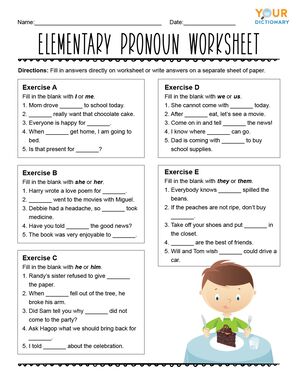
Elementary pronoun worksheet
Click to View & DownloadComparatives and Superlatives
Your 3rd graders are good at their grammar skills — now it's time for them to be the best! Third graders should be able to work with comparative and superlative adjectives and adverbs in the following ways:
- forming comparatives and superlatives
- using comparatives and superlatives
- choosing whether to use a comparative or superlative (depending on context)
For example, 3rd graders need to know the difference between good, better and best, as well as how to properly use them. Give your students more experience with these adjectives and adverbs with an engaging comparative and superlative lesson plan.
Coordinating and Subordinating Conjunctions
After learning the basics of conjunctions in 1st grade, students move on to expanding their knowledge in 3rd grade. They should know:
- coordinating conjunctions (for, and, nor, but, or, yet, so)
- subordinating conjunctions (because, since, although, while, and so on)
Beyond recognizing these words as conjunctions, 3rd graders need to use them in different types of sentences. Practice this grammar skill with these educational conjunction exercises.
Simple, Compound and Complex Sentences
Now that 3rd graders can successfully use conjunctions, they're ready to form different types of sentences. They should be able to form:
- simple sentences (one independent clause)
- compound sentences (two independent clauses joined by a coordinating conjunction)
- complex sentences (one independent clause joined to a dependent clause by a subordinating conjunction)
Writing in different types of sentences helps 3rd graders vary their writing and develop more sophisticated ideas. Foster this skill with a worksheet on combining sentences in different ways.
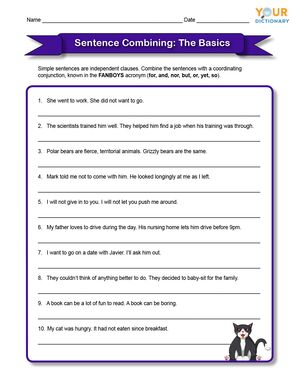
Basics sentence combining
Click to View & DownloadCapitalizing Titles
It can be difficult to know what capitalization rules should be the focus for 3rd graders. But according to the 3rd grade Common Core language standards, they should focus on proper capitalization in titles. Use a capitalization lesson plan and exercise to reinforce title capitalization in 3rd grade. You can also help students master this skill with a 3rd grade capitalization worksheet.
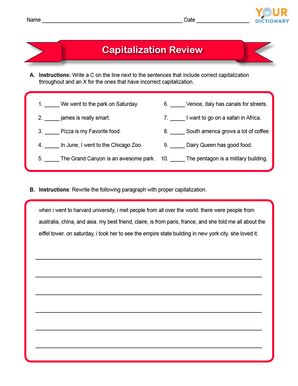
Capitalization review worksheet
Click to View & DownloadUsing Commas in Addresses
By 3rd grade, students should know how to use commas for different purposes in writing. But the specific 3rd grade skill in this area focuses on using commas when writing addresses. For example, when writing "1183 West Pine Street, Seattle, Washington, 98101," 3rd graders should know to include a comma after the street, city and state.
Using Quotation Marks in Dialogue
Creative and narrative writing is an important element of elementary writing. In 3rd grade, they should be able to use quotation marks when writing dialogue. Additionally, 3rd graders should know the rules for using commas in dialogue. Get some extra quotation mark practice before moving on to the next grammar skill.
Forming and Using Possessives
Possessive nouns are another type of noun that 3rd graders should know. By the end of the school year, they should be able to recognize, form and use possessives. Hand out a worksheet on possessive nouns for homework, classwork, or even a short grammar assessment.
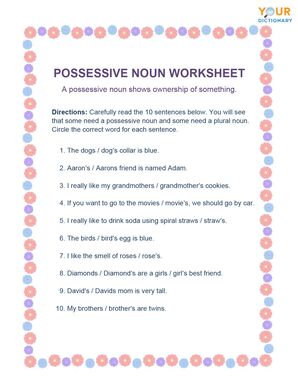
Possessive noun worksheet
Click to View & DownloadOther Key Language Arts Concepts for 3rd Grade
These are the main grammar skills that 3rd graders should know. However, there are several more language skills that these students should work on. They include specific spelling skills, word meaning strategies, word relationships, and word nuance skills.
Spelling Skills
In 3rd grade, students are working on improving their spelling skills. But that doesn't just include memorizing spelling lists. 3rd graders should be comfortable:
- using conventional spelling rules for high-frequency words
- adding suffixes to base words
- using spelling patterns and generalizations
- checking spelling with reference materials
Each strategy is a continuation of what students worked on in 2nd grade, and the step before what they'll be expected to perform in 4th grade. To master these skills, try out these printable spelling activities.
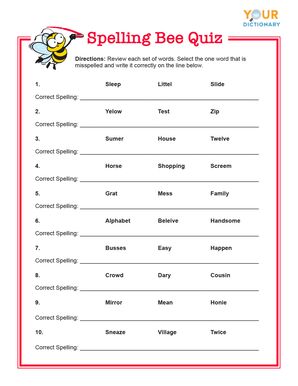
Spelling bee quiz grades 1 3
Click to View & DownloadWriting Conventions
Third graders are on the verge of becoming skilled writers. They should be able to express themselves using their knowledge of language and writing conventions, focusing on:
- choosing words and phrases for effect
- understanding the differences between speaking and written English
Advanced writers may already be able to meet these standards. However, by the end of 3rd grade, all students are expected to write to this level.
Determining Word Meaning
Beyond spelling, 3rd graders need to know how to define both familiar and unfamiliar words. They can do this by:
- using sentence-level context clues
- defining a new word after adding an affix
- identifying a word's root and using it as a clue
- referring to glossaries or dictionaries
Once 3rd graders know how to define unfamiliar words in the above ways, they can read and understand more complex text. Use a prefix and suffix worksheet to practice valuable vocabulary skills in 3rd grade.
Forming Word Relationships
Knowing how words relate to each other is an important part of vocabulary acquisition. Third graders are expected to distinguish between the literal and figurative meanings of words and phrases based on their context. Additionally, they should be able to make real-life connections between words to form a better understanding. Learn how to teach figurative language when reinforcing this valuable language arts skill.
Distinguishing Word Nuances
By the end of the school year, 3rd graders should be able to determine a specific nuance of a particular word. These shades of meaning include states of mind and degrees of uncertainty, which can be found in most 3rd grade vocabulary lists.
Getting 3rd Graders Ready for Upper Elementary
Because 3rd grade is such an important year in a child's education, it's vital that they learn these foundational grammar skills. Ensure that your 3rd graders can meet the challenge of 4th grade and beyond with these teaching ideas for 3rd grade.